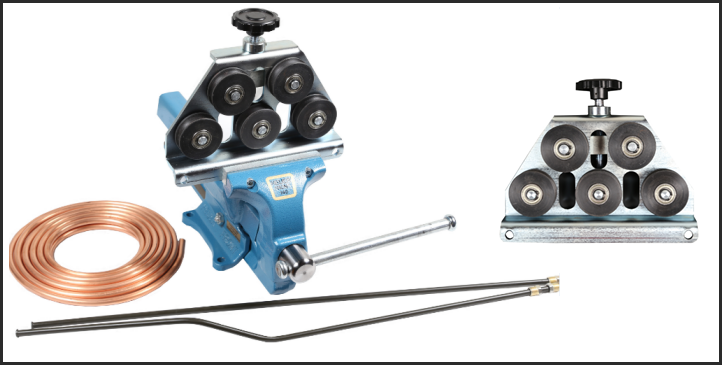
In spite of great advances in manufacturing processes, still most of the tube and pipe production methods produce tubes that are neither round nor straight. In order to reduce ovality, and increase straightness, rotary straightening machines were developed.
The machines that are used for straightening are built with several methods of driving the rolls. While some machines have a discrete drive motor for every roll, majority of current machines use two drive motors – one for the top set of rolls and other one for the bottom set. Irrespective of the way in which the rolls are driven, it is essential that all the rolls revolve at equal speed from about 1 RPM to 2 RPM. Additionally, it is necessary for the manufacturer to build an electronic load sharing system to make sure the power required to straighten is shared equally between both the driving motors. A check of motor loading and roll RPM (Rotations per Minute) should be done, every time the rolls are changed. Further, this post will explain the working of a tube straightener.
Different Straightening Techniques:
Rotary tube straightening machines get their name from the tube that rotates while passing through the machine. The rolls hold and rotate the tube while feeding it through the machine. This is carried out until the entire or the desire length of the tube has been straightened. When the tube passes through the machine, it is exposed to two straightening forces, namely, bend (or offset) straightening, and pressure straightening.
- Bend Straightening: One or more pairs of rolls can be adjusted to cause the tube to follow a curved path through the machine. Bending the tube in this manner is the main straightening action.
- Pressure Straightening: Each pair of rolls can be adjusted so that the gap between them is slightly smaller than the outside diameter of the tube. As the tube passes through this limited gap, it is exposed to pressure. If this pressure is sufficient, then it causes the tube walls to be strained past their elastic limit, thereby causing some straightening of the tube. If the ability to squeeze the tube is used properly, it will help the tube to “round up”, thus removing some or all of its ovality.
You must carefully control the amount of bend, so that it has adequate force to take the tube past its elastic limit to achieve straightness.
Advantages of Additional Bending Moments:
Following are the advantages of additional bending moments:
- With additional bending moments, the operator can apply a big bending moment at the first pair of deflecting rolls and lessen the linear moment. In this case, the final pair of rolls provide a finishing action.
- Large number of plastic cyclic deflections helps to straighten the badly bent tubes.
- They deliver more optimal straightening of the leading as well as the trailing end of the tube.
- Materials such as copper tube, can be so efficiently straightened that no traces of residues are left behind. Subsequent annealing does not change the tube’s straightness.
- Last, but most importantly, they achieve lower straightness and ovality tolerances despite any increase in work hardening.
Woodward-Fab is a well-known firm that provides specialized tube straighteners. TT100 is one of the popular tube straighteners provided by the firm. Let us understand how this product is used.
How to Straighten a Tube using Woodward Fab’s Tube Straightener TT100?
Follow these simple steps to straighten a tube:
- Step 1: Bend the end of the coiled tube
- Step 2: Insert the tube into either side of the tool
- Step 3: With the help of the adjustment knob on the top, bring the rollers into position, and feed the tube through
- Step 4: After enough tube has cleared all the wheels, start pulling the tube through with constant pressure
- Step 5: With the help of the adjustment knob, you can fine tune the alignment for the tube
- Step 6: Pull the required length of the tube through the tool
In case of a pre-cut length of tube that needs to be straightened, you can also do it with the help of Woodward Fab’s TT100 tube straightener. All you have to do is, push the piece through the wheels and work it back and forth. You can fine tune the adjustment knob till all the bends have been straightened.
